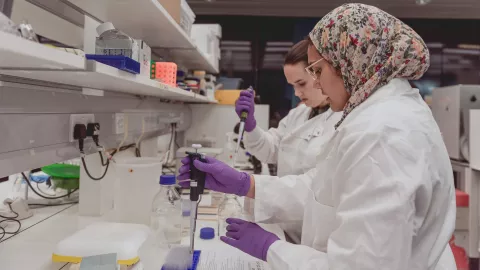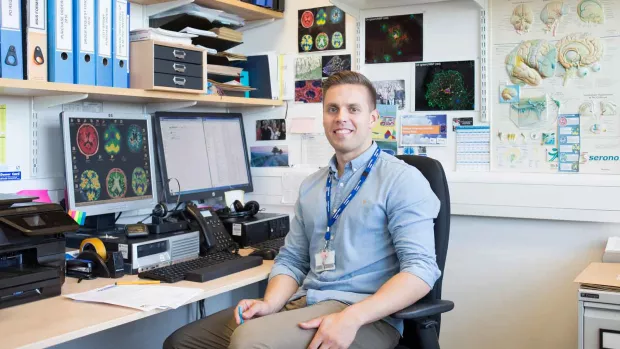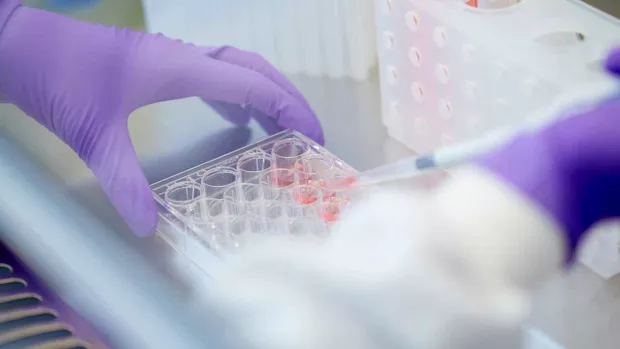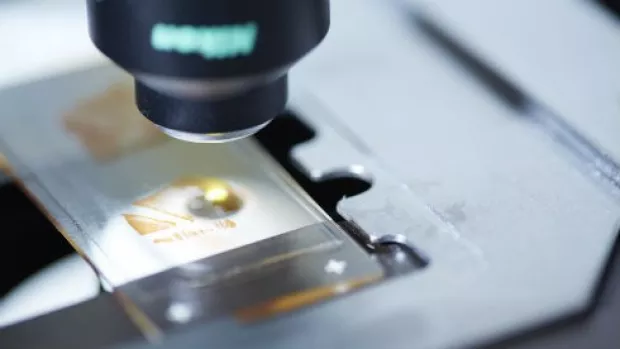
Stem cells
Stem cells are a hugely exciting area of research. As well as being a key research tool, they’re also being developed as treatments for MS, like HSCT.
What are stem cells?
Most cells in the body, like skin or nerve cells, carry out very specific roles and are called specialised cells. Stem cells are different because they’re not specialised, which means they can become lots of different types of cell, like skin cells or immune cells. They’re really important during development, and also to repair damage and replace cells as we age.
When people think of stem cells, they tend to think of cells found in developing embryos. These embryonic stem cells have the potential to grow into any of the cells found in the body. We can also use them in research to learn more about how our bodies develop.
But there are also stem cells found in the adult body. These adult stem cells are found in lots of different tissues, from our bones to our brains. Unlike embryonic stem cells, these can’t make all the cells in our bodies - what cells they produce will depend on the type of stem cell in question and where it’s found.
Stem cell treatments for MS
There are a number of stem cell therapies being developed specifically for MS, including haematopoietic stem cell transplantation (HSCT) and mesenchymal stem cell therapy (MSCT).
But there are many others that have never been trialled in MS. In July 2017 experts called for tighter regulation of unproven stem cell treatments and how they are marketed.
Read expert recommendations on unproven stem cell treatments
Haematopoietic Stem Cell Transplantation (HSCT)
Haematopoietic stem cells can produce all the different cells in your blood, including immune cells.
HSCT aims to ‘reset’ the immune system to stop it attacking the central nervous system. It uses chemotherapy to remove the harmful immune cells, and then rebuilds the immune system using a type of stem cell found in your bone marrow.
Some people with MS can get HSCT on the NHS.
Mesenchymal Stem Cell Therapy
Mesenchymal stem cells are a type of adult stem cell found in many parts of the body. In MSCT, they are usually taken from bone marrow, skin and fat tissue.
They can produce many different types of cells, including muscle and cartilage. Early research suggests they could help promote remyelination and have a positive effect on the immune system.
Read more about mesenchymal stem cell therapy
Myelin repair
In MS, immune cells attack the protective myelin coating around our nerve cells. When myelin becomes damaged, messages find it harder to get through – or can’t get through at all. That’s what causes the symptoms of MS.
Our bodies have an amazing capacity to repair myelin and get nerves working properly again, using oligodendrocyte precursor cells (OPCs) - a type of stem cell found in our brains. If we understand how these stem cells work, and what goes wrong in MS, we could design treatments to repair myelin damage in MS.
Our stem cell research
We’re funding a number of stem cell research projects.
Comparing neurofilaments in alemtuzumab and ocrelizumab and with HSCT
A Phase 3 clinical trial (STAR-MS) is comparing HSCT to alemtuzumab and ocrelizumab in people with relapsing MS.
The use of chemotherapy in HSCT means it might cause damage to nerve cells. In this add-on study to STAR-MS, researchers will compare neurofilaments (a marker of nerve damage in MS) in people taking alemtuzumab and ocrelizumab and those who have HSCT.
How do mesenchymal stem cells work in secondary progressive MS?
This project will increase our understanding of mesenchymal stem cells and the benefit they may have for people with secondary progressive MS. This knowledge will be valuable for the design of clinical trials to test these stem cells as a potential therapy for secondary progressive MS.
We’ve also funded a project that investigated the impact that HSCT has on the immune system. Researchers found that HSCT can change the balance of different immune cells in the body. This gives us a better understanding of the long-term benefits and risks of HSCT for people with MS
Read more about this mesenchymal stem cell project
A clinical trial testing mesenchymal stem cell therapy
This project was part of an international, multi-centre trial to see whether autologous MSC treatment is safe and effective for people with relapsing remitting or progressive forms of MS. The results were announced in September 2019.
Last full review:
We also update when we know about important changes.



